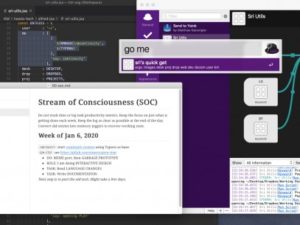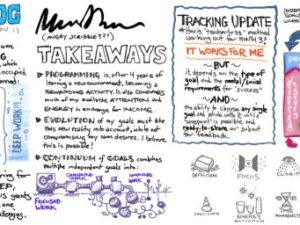(last edited on January 9, 2021 at 9:44 pm)
SUMMARY: It’s the 7th review day for my New Year’s Resolution system, which starts on Groundhog Day instead of January 1st. The salient observation this month is that there’s a difference between “just doing” and “just being”. By just being, I’ve attained a level of self-comfort that is helping me find my groove.
While reviewing last month’s rather scattered review, it’s pretty clear to me that I was just going through the motions to maintain some semblance of purpose. However, the common themes that have been developing over the past couple of years remain fundamentally the same:
- Communicating with a variety of people one-on-one, local and long distance, in person and over the internet, familiar and unknown, for the purpose of mutual inspiration.
- Creating tangible new things every day, and showing what I’ve made to other people.
- Being involved in dreams that are larger than myself, with people that I like and respect, and witnessing them come to fruition.
So the surprising thing about these Groundhog Day Resolution Review days is that they didn’t really ever track individual, concrete goals. Instead, they confirmed broader patterns of satisfaction; each of those three themes I mentioned have proven to be consistent generators of positive energy. In other words, these are activities that make me happy. I just haven’t noticed until now because until last week, I was primarily preoccupied with the management aspects of being happy: work-life balance, motivation, inspiration, entrepreneurship, self-sufficiency, and so on. I was missing the belief in just being…that is, just being happy with what I was doing, instead of fixating on the idea that I woulda-coulda-shoulda done more.
Just Being versus Just Doing
As a productivity enthusiast, I’m confronted with the true-but-aggravating adage just do it on a daily basis. What I don’t like about “just do it” is that it is a symptomatic treatment. Prescribing the “just do it” pill doesn’t address underlying causes of procrastination. For those who just don’t do it on demand, there are indirect approaches. For example, you can wrap a methodology around it (Getting Things Done) that you can be assured has been systematically thought out. You could also wrap a game or trick perspective around it, like this Groundhog Day Resolutions idea. Or, you can just apply role-based motivations-it’s your job to make it happen, or it’s your responsibility as a parent, or it’s the identity you’ve chosen. If you can find satisfaction or useful feedback in any of these approaches, the sense of progress helps maintain momentum and get things done.
Doing generates results, which creates the various forms of currency that we as individuals spend on a variety of material and social goods. On the material level, increased efficiency and quality in what we produce leads to increased income and greater opportunities to generate wealth. On the social level, tangible results creates a sense of accomplishment that can be directly used to guide, influence, and impress other people. Having material and social capital to spend is often motivation enough to keep doing it, and for a time it can distract you from asking the larger questions: what makes me happy and what are my values. So far, my life experiences seem to indicate that no matter what, these questions will eventually emerge and wreak havoc on your life. When your results-based actions don’t feed into your sense of values, you are drawing the fault lines for your own personal earthquake. Or, when your sense of values are muddled by the conflicting expectations that others place on you, nothing seems like a sure thing. We possess the ability to create results, which is kind of like having a sail or engine. However, without those anchoring values about ourselves, we have no ability to stop or say no. We have no ability to steer ourselves because we’re relying on conflicting advice from others to be our compass. Without these two elements of control, we’re doomed to roam the oceans until we crash upon the next shore of opportunity, hoping to make the best of the situation.
The straightforward problem solving approach is to decide what your values are and then come up with ways to effectively make them into tools of control. There are many books that describe how to do this, and which one works best for you will depend on how well it meshes with your own experiences, beliefs, and personality. I myself tend to synthesize approaches based on my own observations, because I enjoy the experimental aspect of doing things this way. This may take longer, but I’ll have the sense of having earned my own progress. I’m stubborn that way, and accepting that is an example of just being.
When I’m “just being”, I’m worried less about the proper way to do things and try to just stumble upon the ways I’m more naturally productive. For example, it wasn’t until my mid-30s that I realized that writing was one of my key creative processes, and that it was a relative advantage in the marketplace. It had always just seemed like something I needed to do before I started my “real” work of doing interactive design or programming. There’s the expression, “one man’s trash is another man’s treasure”, and I eventually learned that writing has its own value depending on where you apply it and how you frame it opportunistically within a particular context. To do that properly, you have to be able to discern the patterns of motivation, psychology, underlying values, and limiting assumptions. Just being also implies confidence and surety about one’s place in the world, whatever it happens to be.
“Just be, and observe the context” is perhaps analogous to “just do it, and assess the effect.” Perhaps this is one more element of work life balance that I need to actively practice.
Current Progress
In terms of supporting mindset, I have:
- gained insight on how to “turn off my brain” to be more productive, as I wrote recently with regards to the manager versus maker mindsets.
- reaffirmed the three fundamental value statements (listed above) that, when I am following them, lead to a sense of accomplishment AND guaranteed progress in areas that I’ve deemed important.
- relaxed about not getting everything done that “would have been nice” (this is the result of “just being”)
In terms of goals, the general ones have remained the same:
- Independence by 2010, which means having more sources of passive income.
- Maintaining my freelance design practice, and also clarifying the types of work that I do.
- Maintaining steady, if not exactly planned, progress toward these goals by continuing to produce something every day.
In terms of specific projects, the current one for this month is printing the new batch of Emergent Task Planner pads, and selling them through Amazon. I have actually gone ahead and signed up for Amazon Pro Merchant and Fulfillment by Amazon, so at least the e-commerce side of things are set up. I am also trying out a new co-management scheme with a friend of mine, helping each other keep on track with our respective professional projects.
I am also considering a new line of business involving web development as a way to meet interesting entrepreneurs. Instead of offering the fanciest, more capable solutions, I’m thinking of offering pretty basic elements that work, a somewhatMuji-like approach to web design. A source of friction between very small businesses and internet developers is the fear-driven disparity in world views, and I think that having a solid set of no-bs components backed by my personal guarantee might be an interesting way to make connections with the right people. I’m running a couple of pilot programs with two new clients, so we’ll see how that goes. In the past I’ve looked for challenges that would push my abilities in new directions, but now I’m looking to pour all my energy into very simple solutions that aren’t very impressive to anyone but those who need them. And I’m not even talking about “engineered simplicity”, where a lot of complexity goes into making something simple to use. I’m talking about making dead simple stuff that just works, the sort of thing that is within the grasp of any first or second-year student, but is so exquisitely explained that you can’t help but learn from it.
So thus ends another rambling report. If you are interested in the past stories on this year’s resolutions, follow the links below:





5 Comments
I think there’s a lot to be said what you term ‘Muji’-like web design. I’ve previously described this as “Zen 2.0”, meaning simple, focused and sparse applications. I think that mobile platforms are naturally more compatible with this ethos given their reduced form factor, performance and the users’ typical desire for quick interaction. Some of my favorite examples would be URL shortening services, Things, and SimpleNote. See http://singlefunction.com/ for a catalog.
To link this comment back to one of your first points: a positive side effect of choosing to restrict oneself to these compact products should be increased “throughput,” with the concomitant positive mental feedback. You could argue that successfully delivering a large number of small projects (vs. fewer large ones) is a way of gaming that motivation system.
Excellent post, I look forward to seeing what this year’s ETP looks like. I’ve been using my 3 pack on and off for the past few years, and I’ve really started to pick up speed in figuring how to use it to my advantage now.
The term “super normal” has been coined by Naoto Fukusawa and Jasper Morrison for Muji-like design. A good friend of mine recommended me their book “Super Normal: Sensations of the Ordinary”. Although the book is about industrial design, it is an example for “good” design in general.
On productivity and What’s It All About, you might see Solzhenitsin here:
http://www.civitate.org/2009/08/solzhenitsyn-on-our-future/
You might also like Norman Foster, Do It Tomorrow, on our work simply being manifestations of our commitments.
Always a pleasure to follow your blog.
Interesting stuff, & beautifully written!
I think I may need to work on this ‘being’ too!! :)
I love the idea of stylish simplicity, so many sites are too cluttered these days..
It’s also good to keep in mind some people may have older computers & may have troubles with too many whistles & bells, or over-zealous flash ads & such that want you to download iffy stuff..